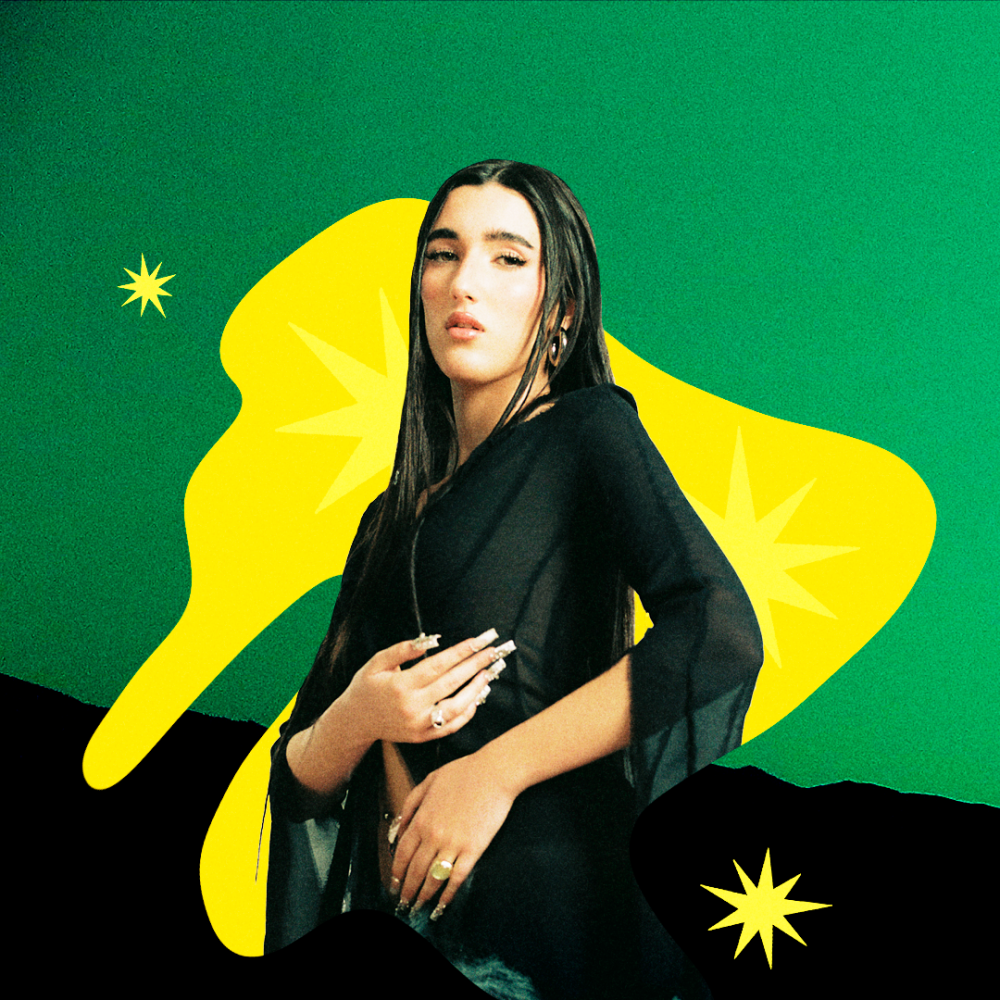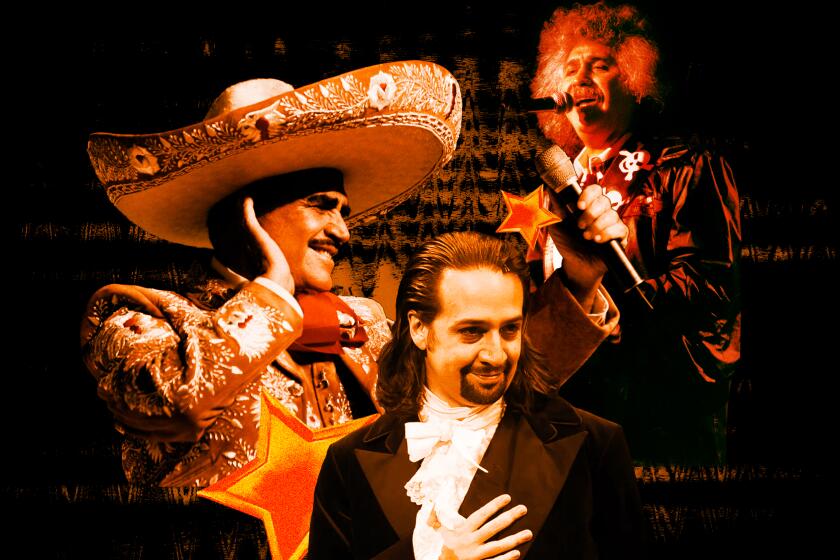
- Share via
Inside her apartment in Madrid, the 22-year-old singer-songwriter Lara Fernández Castrelo, better known as Judeline, is rummaging through her closet, piecing together some desert-friendly looks before hopping a plane to Los Angeles. On Saturday afternoon she’ll make her Coachella debut on the Sonora stage.
It will also be the inaugural stop of her first-ever United States tour, which includes an April 17 date at the Roxy in West Hollywood. Over a video call, I see her standing outside her closet, visibly overwhelmed by the options. “My house is a mess right now — I don’t even know [how many] days I’m going to be in the States — then later Mexico City and Bogotá,” says Judeline. “It’s going to be a crazy trip!”
Released in 2024 via Interscope, her full-length debut “Bodhiria” came to her as a spiritual revelation. The title is derived from the Buddhist term “bodhi,” or a state of enlightenment; for Judeline, “Bodhiria” is the liminal space that her alter ego, “Angela,” occupies between God and her lover. “In the album, I imagine myself as an elevated thing,” she says. “I love when you meet someone and you become so obsessed, it’s almost a divine thing. I love when boys are very obsessed with me. I love to feel romanticized.”

“Bodhiria” is sonically dressed in the trappings of pop, electronica, flamenco and other folk sounds she was raised with. Born in the Andalusian city of Jerez de la Frontera, and raised in the seaside town of Caños de Meca, Judeline incorporated Arabic lyrics and undulating Maghreb rhythms in her single “INRI,” to honor the city’s close proximity to North Africa. “My hometown is so close to Morocco that [we] grew up hearing their channels on the car radio,” she says.
And with the fluttering strums of a cuatro venezolano in “Joropo,” she called attention to the South American folkloric genre of the same name. She learned how to play the cuatro from her father, whose family took refuge in Venezuela during the Spanish Civil War. They recorded “Joropo” together in a studio in Madrid, with the help of her trusted producer duo, Tuiste and Mayo.
“I called him and I said, ‘Papá, I want to do a joropo. Come to the studio and let’s try it,’” she recalls. “It was very, very cute. My dad never had the chance to go into [a] studio. He was so happy to share this [sound] with young people. He would play me a lot of Venezuelan music, Brazilian bossa nova, but also a lot of rock and the Beatles.” (Fun fact: Her stage name is a play on her dad’s favorite Beatles song, “Hey Jude.”)
By the time she started writing “Bodhiria,” Judeline had already won the favor of massive hitmakers like Rosalía and Bad Bunny; they each took to social media to share songs from her EP “De la Luz,” which she released independently in 2022. The following year she signed to Interscope and graced the reggaeton track “Si Preguntas Por Mi” with Puerto Rican star Kris Floyd and artist-producer Tainy. By the spring of 2024, she was opening for J Balvin on the European leg of his “Que Bueno Volver a Verte” tour. “Bodhiria” was executive produced by the Grammy-winning diva whisperer Rob Bisel, who famously led production on records by SZA, Doja Cat and Tate McRae.

With an abundance of powerful co-signs, Judeline joined the rising tide of Spanish-language artists bridging the gap between regional sounds and the global pop mainstream. Yet it was American pop music, she says, that inspired her to express herself more boldly.
“I was born in 2003,” she says. “Like all the other kids, I was a fan of Katy Perry, Lady Gaga, Selena Gomez. I wanted to become a singer because of Hannah Montana. When Miley Cyrus changed to her ‘Wrecking Ball’ era … and all these singers were experimenting with their sexuality … I was obsessed! That strong expression of sexuality, I loved it.”

Judeline’s songs are imbued with a bewitching sensuality and romanticism that verges on religious devotion. In her psychedelia-tinged guitar ballad, “Zarcillos de Plata,” she winks at her weakness for gangsters and bad boys, in whom she looks for something more profound beneath the surface. “And if they have to separate us again / I’m going to bless you from heaven,” she sings in Spanish.
Although she practices spirituality in a more personal way than can be described by any one religion — “When I’m stressed, I pray el Padre Nuestro, but I also believe in the law of attraction,” she says — the cultural dominance of Catholicism in her community inevitably colored her work as an artist. Having such a foundation of faith, she says, is what drove her to move to Madrid and pursue a career in pop music at 16; it’s what drives pop fandoms, as well. “All religion is about being fanatic with something,” she says.
“Where I’m from, people go crazy for all the saints and the virgins,” she adds. “They cry, they scream. It’s similar to how we feel about pop stars, too. I cried when I saw my favorite Christ statue, and I cried when I saw my favorite singer on TV.”
Judeline will no doubt provoke cries of adulation and ecstasy in the crowd at Coachella — and eventually, in cities across the Western Hemisphere. Catch her at the Sonora stage on Saturday, April 12 and 19 from 3:50 to 4:30 p.m.
More to Read
The Latinx experience chronicled
Get the Latinx Files newsletter for stories that capture the multitudes within our communities.
You may occasionally receive promotional content from the Los Angeles Times.







